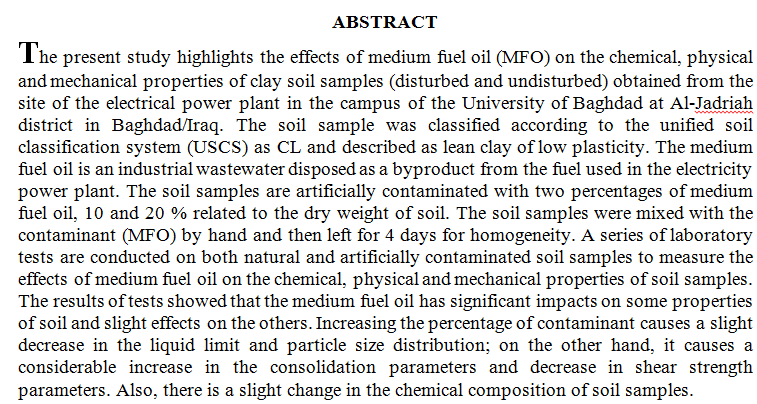
 (1)
(1)
 (1)
(1)
 (1)
(1)
 (1)
(1)
The performance of a diesel engine was tested with diesel oil contaminated with glycol at the engineering workshop/Department of Agricultural Machines and Equipment / College of the Agricultural Engineering Sciences at the University of Baghdad. To investigate the impact of different concentrations of glycol on the performance of a diesel engine, an experimental water-cooled four-stroke motor was utilized, with oil containing 0, 100, and 200 parts per million (ppm). Specific fuel consumption, thermal efficiency, friction power, and exhaust gas temperature were examined as performance indicators. To compare the significance of the treatments, the study employed a full randomization design (CRD), with three replicates for each treatment at th
... Show MoreThis study was aimed to investigate the effect of essential oil extracted from the yellow peels of Citrus aurantium on the growth of four species of fungi: Penicillium expansum, Penicillium oxalicum, Fusarium oxysporum and Fusarium proliferatum and effect of one fungicide: Aliette (fosetyl-aluminum) against these fungi. The results showed that the essential oil of C. aurantium inhibited the radial growth of P. oxalicum at concentration 4.5% while P. expansum and F. oxysporum at concentrations 5% and F. proliferatum at concentrations 5.5% additionally the one fungicide tested showed inhibitory effect on radial growth of these fungi. So that there is a negative relationship between the increasing of concentration and radial growth of fungi.
The herbal remedy individually or in combination with standard medicines has been used in diverse medical treatises for the cure of different diseases. Pumpkin seed oil is one of the recognized edible oil and has substantial medicinal properties due to the presence of unique natural edible substances. Inflammation is an adaptive response that is triggered by noxious stimuli and conditions, which involves interactions amongst many cell types and mediators, and underlies many pathological processes. Unsaturated fatty acids (UFAs) can influence inflammation through a variety of mechanisms, and have been indicated as alternative anti-inflammatory agents to treat several inflammatory skin disorders. Pumpkin seed oil is rich in (UFAs), that its t
... Show MoreThe present research has investigated the effect of microwave energy on improving the flow properties of heavy crude oil. The fragmentation of crude oil molecules was carried out with and without using 1 and 10 wt. % concentration of various types of H-donors like tetralin, cyclohexane, and naphtha. Microwave power of 320, 385, and 540 W and radiation time 1-9 min, and temperature were studied. The kinematic viscosity and asphaltene content were measured for evaluation the improving of heavy crude oil.
Results show that viscosity of crude oil decreased with increase H-donor concentration, a maximum percentage of viscosity reduction was10.63 % for tetralin at 6 min radiation time, while 8.67%, and 7.34% for cycl
... Show MoreA microbial desalination cell (MDC) is a new approach to bioelectrochemical systems. It provides a more sustainable way to electrical power production, saltwater desalination, and wastewater treatment at the same time. This study examined three operation modes of the MDC: chemical cathode, air cathode, and biocathode MDC, to give clear sight of this system's performance. The experimental work results for these three modes were recorded as power densities generation, saltwater desalination rates, and COD removal percentages. For the chemical cathode MDC, the power density was 96.8 mW/m2, the desalination rate was 84.08 ppm/hr, and the COD removal percentage was 95.94%. The air cathode MDC results were different
... Show More (4)
(4)
PVC/Kaolinite composites were prepared by the melt intercalation method. Mechanical properties, thermal properties, flammability and water absorption percentage of prepared samples were tested. Mechanical characteristic such as tensile strength, elongation at break; hardness and impact strength (charpy type) were measured for all samples. It was found that the tensile strength and elongation at break of PVC composites decreased with increasing kaolinite loading. Also, the hardness of the composites increases with increase in filler content .The impact strength of the composites at the beginning increases at lower kaolinite loadings is due to the lack of kaolin adhesion to the matrix. However, at higher kaolin loadings. This severe agglom
... Show MoreAn ultrasonic treatment was applied to the vacuum gas oil at intervals of 5 to 30 minutes, at 70°C. In this work, the improvement of the important properties of Iraqi vacuum gas oil, such as carbon residue, was studied with several parameter conditions that affect vacuum efficiency, such as sonication time (5, 10, 15, 20, 25, and 30) min, power amplitude (10–50%). After ultrasonic treatment, the carbon residue of vacuum gas oil was evaluated using a Conradson carbon residue meter (ASTM D189). The experiment revealed that the oil's carbon residue had decreased by 16%. As a consequence of the experiment It was discovered that ultrasonic treatment might reduce the carbon residual and density of oil samples being studied. It also notice
... Show More (1)
(1)
